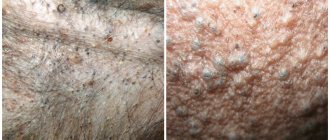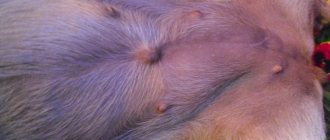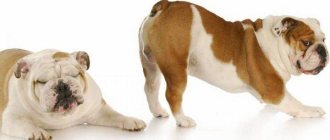The main causes of gases
In normal and pathological conditions of the dog’s stomach, it is important to establish the functional activity of the stomach and intestines, the state of digestion. To do this, veterinarians, in addition to a clinical examination of the animal, conduct laboratory tests of the contents of the stomach and intestines, and, sometimes, X-rays of these organs can be performed.
But, before you start loading your head with information about the pathological processes of your pet’s stomach and intestines, which are accompanied by rumbling, you need to take into account that this symptom may be a completely normal condition of the animal.
Where do gases come from in a dog's intestines?
A healthy dog has only beneficial bacteria in its intestines. Without them, the process of digesting food is impossible. They extract useful components from it, which are absorbed into the blood and carried to every cell of the body. Another task of bacteria is “cleaning,” that is, processing food debris to such a consistency that the intestines can empty without problems.
The healthy life of bacteria always involves gas formation. Excess gases are eliminated naturally. Simply put, the dog farts. Sometimes there may also be belching. If these “antisocial” phenomena are observed infrequently, are associated with gluttony, and are not accompanied by vomiting, diarrhea and other symptoms of illness, there is no need to worry. Just remove from your dog’s diet everything that causes rumbling and emitting gas. What to do if your dog's stomach is rumbling
constantly?
In this case, you cannot do without veterinary help. The animal needs to be examined, as this symptom may indicate the development of a dangerous condition - flatulence
.
Causes not related to pathology
Let's look at the physiological conditions in which rumbling can be noticed:
Normal condition. Often accompanied by digestion of food in the dog if it lasts more than a couple of hours.
Genetic predisposition. This point can be justified by the fact that dogs, or more precisely their digestive tract, from the very moment of birth are predisposed to their poor condition (weak stomach and intestines).
Excessive food intake (overfeeding). This condition often causes an overflow of food in the dog's intestines, which requires a huge amount of energy and causes a rumbling process.
Unbalanced diet. If there is a deficiency or excess of any micro- and macroelements, vitamins and minerals, this also often leads to rumbling. If there is a lot of food that is poorly balanced in proteins, fats and carbohydrates, the dog’s stomach will growl.
Eating food that is not suitable for your dog. Eating spicy and salty foods, sweet, smoked, and excessively fatty foods. All this will lead to rumbling.
Quick transition from one type of dog feeding to another. For example, you gave your dog food “from your table”, and then suddenly decided to switch it to specialized dry or wet pet food.
The excited state of the animal. If your dog is very active, such as during play or walking, this can often lead to purring.
When bitches are in heat. Estrus is a normal physiological process of the body, which is manifested by the stages of the reproductive cycle and sexual activity of the female. Rumbling appears if there are spasms in the uterus, which occur due to muscle contraction in the lower abdomen;
During pregnancy. The uterus may rumble.
Reasons why a dog's stomach growls loudly
The digestive tract often makes sounds when digesting food; this is a normal phenomenon associated with intestinal motility.
This condition may indicate a disruption of the gastrointestinal tract, pathological changes, inflammatory diseases, or other problems indicating an unhealthy dog, to which many breeds are susceptible: Yorkies, Chow Chows, and Chihuahuas. Rumbling is common in puppies.
Gas formation is the result of healthy bacterial activity
In order to relieve your pet of such discomfort, it is necessary to establish the cause of increased gas formation.
Binge eating
The desire for a hearty meal has been genetically embedded in them since time immemorial. No matter how much you put food in your pet’s bowl, he will eat everything at once and ask for more. When you overeat, the digestive system cannot cope. The food does not have time to be digested in large quantities and is retained in the gastrointestinal tract.
At the same time, processes of rotting and fermentation of stale food occur. When fermented by bacteria and microorganisms that exist in every healthy intestine, gas is released. When it accumulates, bloating and seething occurs in the abdomen with corresponding sounds. This condition causes discomfort and pain in the dog.
Poisoning
Scavenger dogs. They select and taste everything that piques their interest. If during a walk the dog gets off the leash and is not under close attention from the owner, poisoning is possible.
Eating too much can cause hiccups, bloating, excess gas, and a rumbling stomach.
This condition is characterized not only by rumbling in the stomach, but also by a general deterioration in the pet’s well-being. May be accompanied by vomiting, diarrhea, and fever. In acute cases, the death of the pet is possible.
It can seethe for a long time. In case of severe conditions of the pet, the help of a veterinarian is necessary.
Swallowing air
Dogs are usually fed twice a day.
With such large intervals in feeding, the animal has time to become very hungry. And as soon as he sees food served to him, he pounces and begins to quickly and greedily eat. In this case, food is swallowed in large volumes along with air.
If your dog has a tendency to flatulence from birth, then you should not feed him commercial food.
Part of it gradually comes out in the form of belching, moving through the gastrointestinal tract and making gurgling sounds. The remaining volume of air moves through the intestines along with the food bolus, causing bloating, colic and rumbling, until it comes out through the anus.
In order to reduce the swallowing of air when eating, you can feed the dog more often, dividing the daily intake into three meals. It is also possible to change the position of the bowl in relation to the dog’s head (raise it higher or lower it) so that the dog can eat comfortably.
Parasites
Helminthiasis is a disease caused by parasitic worms in the animal’s body. Settling in the gastrointestinal tract, worms feed on food that enters it. At the same time, the products of their vital activity are gases and toxins. Abdominal bloating, constant rumbling and pain are symptoms of helminthiasis and require anthelmintic therapy.
Diseases accompanied by stomach turmoil
Now let's begin to consider the pathological processes (diseases) that are accompanied by rumbling. The symptom is not the main one, but appears together with other symptoms. And yet, you need to focus on the liver, which is inextricably linked with almost all types of metabolism, and therefore is often involved in the pathological process, which is accompanied by rumbling. Also, the stomach can rumble when bitches are in heat, which we will also consider. But this will not be a pathological process.
To begin with, we list the symptoms that are the main ones for gastrointestinal pathologies:
- rumbling in the dog's stomach;
- diarrhea;
- vomit;
- gases;
- belching.
These symptoms for diseases of the stomach and intestines most often occur simultaneously. Below we will briefly describe the main diseases that occur with these symptoms:
Poisoning in a pet, accompanied by rumbling, vomiting and diarrhea. Under the influence of toxicosis and intoxication (poisoning with toxins and toxic substances), the biochemistry of the animal is disrupted.
Gastritis: seething in the stomach, no appetite, diarrhea, vomiting, belching and gas, bloating. Gastritis is an inflammation of the gastric mucosa that disrupts its integrity and basic functions.
Gastroenterocolitis , in which symptoms such as rumbling, not eating, diarrhea, vomiting, symptoms of flatulence and belching, bloating also appear. Gastroenterocolitis is an acute polyetiological disease of the gastrointestinal tract.
Stomach ulcer. The disease is chronic in nature and is accompanied by disruption of regulatory, nervous and hormonal mechanisms. An ulcer forms on the mucous membrane. Symptoms appear: stomach growls, does not eat, constipation, gas formation.
Intestinal blockage. Occurs due to the ingress of foreign objects that block or narrow the lumen of the intestines. These can be stones, pieces of bones, sticks and anything else that can be found. Sometimes blockage occurs due to severe intestinal infestation. Symptoms: not eating, stomach rumbling, constipation and flatulence.
Hepatosis. This is a dystrophic change in the liver parenchyma, without signs of inflammation. Symptoms: lack of appetite, abdominal sounds, vomiting and diarrhea, gas formation;
Cirrhosis of the liver. A chronic process associated with the death of liver cells.
Symptoms: the dog does not eat, his stomach growls, gas appears, belching, vomiting.
If your dog has diarrhea
Rumbling in the stomach can be a harbinger of diarrhea. Sometimes the dog owner should consider grumbling as a signal for an extraordinary walk to empty the bowels. Diarrhea depletes and dehydrates the dog’s body and does not go away on its own. This is an important reason to go for a consultation at the veterinary clinic.
Diarrhea can be the result of poisoning if the dog picks up and eats something on the street. Worms and inflammation of the gastrointestinal tract also often cause food refusal, vomiting and diarrhea.
Prevention
Prevention of physiological processes is very simple if they are not taken to an extreme degree when it is impossible to eliminate them. So, how to do prevention?
- Do not overfeed the animal beyond measure, and do not suddenly switch to other foods.
- Try to find your own guide to balancing your animal’s feed; if this doesn’t work, contact a specialist.
- Do not feed your pet food that is not suitable for its body, or rather, for digestion in the dog’s stomach.
Prevention of stomach and liver diseases:
- proper, balanced and nutritious nutrition for the animal;
- preventing poisons, chemicals, toxins and foreign objects from entering the dog’s body;
- animal vaccination.
Therapy with a specialist
When contacting, the veterinarian will examine the symptoms bothering the animal and determine the causes of the disease. In addition, he will analyze your diet.
Gastritis
If gastritis is diagnosed, a fasting diet is prescribed for 1 or 2 days. Water is not limited.
- gastric lavage. Use 1% sodium chloride solution, 0.05% lactic acid solution or potassium permanganate;
- taking 1 tablespoon of natural gastric juice or plantaglucide;
- antibiotics or sulfa drugs;
- taking vitamins, enzymes;
- dieting. Course - 1 month.
The same thing if the diagnosis is gastroenterocolitis, poisoning and ulcer.
Intestinal blockage
- surgical intervention to remove foreign bodies;
- oily and mucous agents are prescribed;
- warm enemas with soapy water and disinfectants.
Hepatosis
- a diet excluding fish, bones, dry food, spices, fats, oils, bread;
- Lipotropic, vitamin and choleretic drugs are prescribed.
Cirrhosis of the liver
- the diet consists of easily digestible feed with plenty of proteins and vitamins;
- drug treatment in later stages is not effective;
- prescribe hepatoprotectors that will alleviate the condition;
- Choleretic drugs are widely used.
Treatment of flatulence
When a dog’s stomach is rumbling, the veterinarian can tell you what to do only after finding out the causes of flatulence. If it’s simple gluttony or unsuitable food, you just need to change the diet and feeding regime. If the bloating is caused by worms, anthelmintics are given.
Gurgling or rumbling sounds in a dog's stomach can be signs of hunger and an empty stomach, as in many species of predators. This condition is aggravated by aromatic smells and the type of food. In some cases, a dog's stomach growls due to diseases of the gastrointestinal tract. It is considered normal to hear such a sound no more than once a day. Large breeds of dogs are more prone to purring.
Rumbling in the stomach is considered a symptom of flatulence. It may be the result of health problems.
The main causes of flatulence:
- binge eating;
- helminthic infestations;
- dysbacteriosis;
- increased stomach acidity;
- transition to a new type of food;
- unbalanced food with a lot of fiber;
- poisoning.
The dog is prone to overeating. If rumbling is observed immediately after eating, the next time the serving size should be reduced. In addition, the composition of the food is of great importance for the pet’s digestion. Dogs, as predators, are more suitable for grain-free dry food - holistic. Their intestines are short and long fiber fibers accelerate peristalsis, but do not allow the necessary proteins to be absorbed.
Some owners add boiled potatoes to their dog's food to save money. Potatoes are not digested in the dog's digestive tract and cause bloating, flatulence and rumbling in the stomach. The same can happen from corn and bread. Correction of nutrition eliminates unpleasant phenomena.
Switching to a new type of food may cause rumbling. A sudden change of food is undesirable. The transition should be gradual, with a small portion of new food being added to the old food, changing the ratio from time to time in favor of the new food.
Playing games immediately after eating or drinking large amounts of water after an intense walk are not beneficial. Almost any dog can have a growling stomach. After eating, the dog should lie down for about an hour, rest and calmly digest the food. A dog that is hot from running or playing should calm down and cool down before drinking or eating. The dog’s gastrointestinal tract is prone to kinks and “volvulus.” Therefore, eating and drinking regimen is important.
Video
Currently, stomachs and intestines are highly susceptible to various diseases, which, if improperly treated or poorly attended by the owner, can lead to the death of the animal. Various foods, toxic and chemical substances, environmental pollution, infections, parasites, viruses and much more can instantly affect the condition of the dog’s digestive tract, which in turn requires an immediate response from the animal’s owner. Sensitive guidance, attention, care and love are very important for your pet, because his life depends on it.
Do not self-medicate, and if in any doubt, contact a specialist at a veterinary clinic.
Diarrhea, rumbling in the stomach. Help me please.
Hello, Jack Russell Terrier, 1.9 years old. Everywhere there were problems with stool - constant diarrhea, and the dog NEVER had diarrhea with which he asked to go outside, i.e. he goes for walks (3 times a day), poops twice in the morning and during the day, as a rule, the first time he poops very well - formally, but the second time he has diarrhea! At the same time, the dog behaves as usual, active, and has an excellent appetite. We tried several options for good food, including medicinal ones. We settled on Royal Canin hypoallergenic DR21, there were practically no problems with it for 5 months. In August they did an allergy test, it turned out that the dog was allergic to rice, corn, soybeans, potatoes, carrots, and tomatoes. We continued to feed the hypoallergenic Royal Canin, although it contains rice, but after reviewing the compositions of all hypoallergenic foods, I did not find a single one where there was no rice, no potatoes, no corn. A couple of weeks ago there was a terrible breakdown of the gastrointestinal tract - the day before my stomach was rumbling strongly, on a morning walk I had terrible diarrhea streaked with blood, the dog refused to eat, it was clear that my tummy hurt. Suspicion (my personal) of an infection picked up in a dirty pond - the dog was dragging roots from the bottom, 3-4 days before. The veterinarian gave general blood, biochemical analysis, urine and feces. Everything is okay! Well, I don’t understand how this happened. They didn’t send the stool to the laboratory, but checked it on the spot - they said there was no blood, no parasites. We were prescribed Metronidazole for 5 days and a probiotic with a prebiotic. I started giving Hills I/D canned food myself. I felt bad from the canned food, so I switched back to Royal Canin, and after a couple of days, with antibiotics, everything returned to normal. I pooped once during the walk and it was beautiful. A few days after the course of antibiotics, the dog’s tummy began to growl again and diarrhea began again. The sounds of rumbling - as if small bubbles were rolling inside, I don’t know how else to describe these sounds. I am attaching the results of our tests, there are slight deviations, but the doctor said that this is not worth attention. By the way, the worms were routinely driven away at the end of August with Milbelmax (I think that’s what it’s called). Please tell me what should we do? I can submit my stool for a detailed analysis, because... All our other tests are normal (and have always been normal), I’m at a loss - maybe an ultrasound of the abdominal cavity should be done? Maybe it makes sense for us to do a gastroendoscopy? Will this be a justified action, given that anesthesia will have to be given? How much harm does anesthesia generally harm the health of an animal during gastroendoscopy? - Is it dangerous? If everything is fine with metronidazole, does that mean we have some kind of inflammation? Or maybe the reason is in protozoa, which were not killed by a five-day course of Metronidazole? - could this be? And another question - not all food products are included in the test, does this mean that the dog is not allergic to them? Maybe it makes sense for me to carefully try feeding buckwheat with meat? — what if it’s all about allergies and the fact that rice comes first in the food? (by the way, all the products to which the dog is allergic show in the test - 100-120, with a range of 100-5000, i.e., as I understand it, it is not very pronounced? For example, in the rice it shows 116) I would be very grateful for your answer, They have already tortured themselves and they have tortured the dog, as long as the dog lives, he vilifies so much, well, there must be a reason and a diagnosis.. Thank you.











